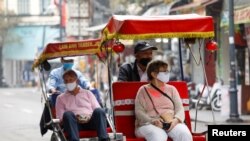Vietnamese officials are preparing for a limited economic revival as their coronavirus caseload stays low.
Despite its land border and close trade relationship with China, Vietnam reports only 85 widely dispersed coronavirus cases, and it sometimes goes for days with no new cases.
The government is rolling out incentives now to revive companies including export manufacturers, a backbone of the economy that has grown around 6% per year since 2012, although the borders are largely sealed to inbound travelers.
“Materials are starting to come in and [factories] picked up a little bit, but the real concern they have a tourism and foreign flow, so they’re really tightening that up,” said Mike Lynch, managing director with SSI Institutional Brokerage in Ho Chi Minh City.
As with countries elsewhere in Southeast Asia, Vietnam is offering tax breaks, extending tax due dates and allowing delayed land-use fee payments to companies affected by the outbreak, business consultancy Dezan Shira & Associates said in an online briefing Tuesday.
The central bank cut its benchmark refinance 1 percentage point Tuesday to stimulate business activity.
“This is all they can do in response to the virus outbreak of trying to mitigate the impact of the outbreak on their economy,” said Song Seng Wun, a Southeast Asia regional economist in the private banking unit of CIMB in Singapore. “It’s about helping to minimize disruption and saving jobs.”
Epidemic control
Vietnamese officials reacted to the virus early on by banning arrivals from China. People ordered into quarantine normally comply, at the risk of being scorned otherwise on social media, two authors from the Ho Chi Minh City-based University of Economics School of Government wrote in a March 17 article in The Diplomat online.
The country discloses its caseload openly and doesn’t silence public discussion, the scholars said, suggesting it had tried to avoid repeating China’s response.
Vietnam quit issuing visas to almost all foreign nationals for 30 days, starting March 18. Ho Chi Minh City authorities plan to curb meetings geared for more than 1,000 people. Bars and cinemas are closed through March 31.
The halt to visas will hurt hotels, airlines and travel agencies, analysts in Vietnam said. Inbound tourism had grown from 5 million to 15 million between 2010 and 2018. China and South Korea are the top two sources.
People in Vietnam are staying home more often than usual, in some cases working there instead of in offices. Restaurants still operate, though sometimes for fewer hours per week than before, residents of the two biggest cities said this week.
When the government declares an end to local coronavirus spread, the domestic economy is likely to bounce back as far as it can without foreign visitors including tourists, said Adam McCarty, chief economist with Mekong Economics in Hanoi.
“When that point happens, the government will say OK, it’s clear, restaurants are on and everyone can go out,” McCarty said, “The domestic economy could revive and all the masks could come off, so that would be a big stimulus and that could happen in less than a month from now.”
Factories are operating – for now
The country’s economy is doing relatively well, for the moment.
Factories are still operating on local labor, and export growth from January 1 through March 15 grew 6.8% over the same period of 2019.
“Even with the first quarter quickly drawing to a close, the data [are] way better than what the doom and gloom crowd would have had you believe,” SSI Research said in market update note Thursday. “The Vietnamese economy actually performed to a degree that other national economies nowadays would give an arm and a leg to have.”
However, the demand for factory goods is expected to slump in Western countries as consumers stay home. The disease outbreak appears to be a “potent direct hit on confidence,” the Harvard Business Review said March 3.
About 55% of Vietnam’s economy, more than the global average, has relied on export manufacturing from 1986 through 2018.




